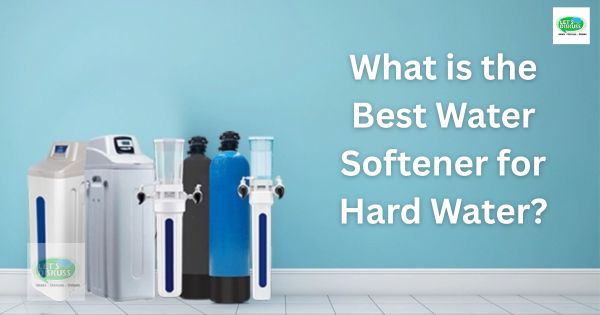university.nakul@gmail.com | Posted on
Hard water is a common issue encountered by most households in different parts of the world, and it is most notably defined by the presence of high concentrations of specific minerals like calcium and magnesium. These specific minerals have the capacity to cause excessive scale formation in plumbing systems, which further can lower the efficiency of household devices and even cause a variety of skin and hair problems. To effectively address the problems created by hard water, the water softener is presented as an extremely effective solution, as it is specifically engineered to eliminate or neutralize the same offending minerals, thus creating an outstanding difference in water quality that is perfect for daily use. The process of selecting the most suitable water softener includes consideration of several factors like the degree of severity of the water hardness encountered, the household needs, and the available budget for the same. To guide you through this critical decision, below you will get a complete and detailed guide that is crafted to increase your knowledge and help you select the finest water softener suitable for hard water conditions.

Understanding Water Softeners
Water softeners can accomplish this efficiently by eliminating or modifying the very same minerals that make water hard. The most widely used process to do this is ion exchange, whereby calcium and magnesium ions, which cause water hardness, are replaced one after the other with sodium or potassium ions. Not only does this specific process efficiently inhibit the formation of scale in appliances and plumbing but also makes the overall efficiency of used soap and detergent in general much greater. In addition to this, it serves the necessary purpose of inhibiting damage to appliances in households caused by hard water, all while also making the overall quality of water being consumed on a daily basis much better.
Types of Water Softeners
-
Salt-Based Water Softeners:
-
These are the most common and effective type of water softeners.
-
They use a salt solution to regenerate the softening resin, which removes calcium and magnesium from the water.
-
Regular maintenance and salt replenishment are required.
-
-
Salt-Free Water Softeners:
-
Instead of removing minerals, these systems alter their structure to prevent scale formation.
-
They are low-maintenance and environmentally friendly but may not be as effective in extremely hard water conditions.
-
-
Dual-Tank Water Softeners:
-
Ideal for larger households or commercial applications.
-
They have two tanks that ensure a continuous supply of soft water even during the regeneration cycle.
-
-
Magnetic and Electronic Water Conditioners:
-
These use electromagnetic fields or electronic pulses to alter the properties of minerals, reducing their tendency to form scale.
-
They are easy to install but their effectiveness can vary.
-
Factors to Consider When Choosing a Water Softener
-
Water Hardness Level:
-
Test your water to determine its hardness level. This will help you choose a softener with the appropriate capacity.
-
-
Household Size:
-
Larger households may require a dual-tank system or a softener with higher capacity.
-
-
Budget:
-
Water softeners range from affordable options to high-end systems. Consider your budget and long-term maintenance costs.
-
-
Maintenance Requirements:
-
Salt-based systems require regular salt replenishment, while salt-free systems are low-maintenance.
-
-
Environmental Impact:
-
Salt-free systems are more eco-friendly as they do not produce wastewater or require chemicals.
-
-
Installation and Space:
-
Ensure you have enough space for the softener and consider whether professional installation is needed.
-
Top Water Softeners for Hard Water
Here are some of the best water softeners available in the market:
-
Water Science CLEO SFU-717 Shower & Tap Filter:
-
Features a four-layer filtration system.
-
Ideal for reducing hardness in water used for showers and taps.
-
-
3D Aqua Water Softener:
-
Offers both salt-based and salt-free options.
-
Suitable for residential and commercial needs.
-
-
IONIX Water Softener:
-
Provides powerful filtration with 15 stages.
-
Effective in removing chlorine and improving hair quality.
-
-
Pearl Water Technologies 500 LPH Fully-Automatic Water Softener:
-
Designed for high-capacity usage.
-
Fully automatic operation.
-
-
OQUA Central Water Softener System:
-
Salt-free and anti-scaling technology.
-
Long-lasting with minimal maintenance.
-
-
Fleck Whole House 64K Water Softener System:
-
High-capacity system with advanced resin technology.
-
Suitable for large households.
-
-
Althy WS200 Whole House Water Descaler System:
-
Salt-free and electronic-free.
-
Reduces limescale and prevents rust.
-
Benefits of Using a Water Softener
-
Protects Appliances: Prevents scale buildup in washing machines, dishwashers, and water heaters, extending their lifespan.
-
Improves Skin and Hair Health: Soft water is gentler on skin and hair, reducing dryness and irritation.
-
Enhances Cleaning Efficiency: Soft water improves the effectiveness of soaps and detergents, leading to better cleaning results.
-
Reduces Plumbing Issues: Prevents clogging and corrosion in pipes caused by hard water.
Conclusion
Choosing the most suitable water softener to address the problems of hard water must be clearly understood by knowing your individual needs as well as the various options available in the market. You can choose a salt-based system, which works best in addressing hard water problems, or choose a salt-free system, which is eco-friendly and environmentally oriented. Regardless of the type you select, using a water softener can greatly improve the quality of your water, which can greatly improve your overall quality of life at home. You need to consider a variety of things before making your choice, including the hardness of your water, the size of your household, your budget constraints, and the maintenance cost of various systems. By selecting the right water softener for your situation, you will not only be able to protect your appliances from the detrimental effects of hard water, but you will also improve your health and enjoy the numerous advantages that come with the use of soft water in your daily life.
0
0 Comment
